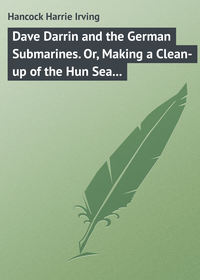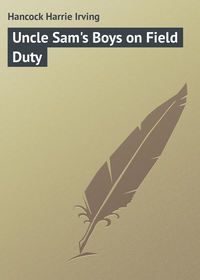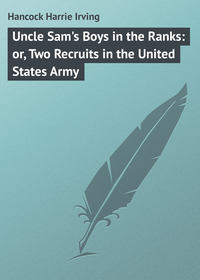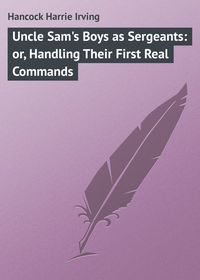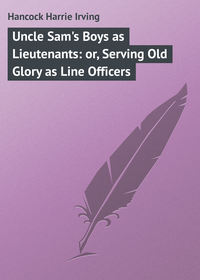 полная версия
полная версияThe Motor Boat Club at the Golden Gate: or, A Thrilling Capture in the Great Fog
Dick Davis and the boat's crew had been hurled from the overturning boat!
CHAPTER VIII
THE REAL KENNEBEC WAY
The young skipper of the "Panther" brushed his hand past his eyes.
It was no dream, no trick of the vision. The life-boat was overturned, riding keel upward, while two of its crew clung desperately to the keel. A third head could be seen bobbing on the water. What had become of the other three human beings?
"Mr. Perkins, take command of the 'Panther,'" ordered Tom, hoarsely. "Mr. Dawson, you and Mr. Prentiss, with two of the quartermasters and the remaining seaman, stand by the starboard life-boat. I'll go in charge."
All those ordered sprang to their posts. Like a flash the davits were swung around outward, other hands loosening the lowering tackle.
"Captain, this is madness," remonstrated Mr. Baldwin. "If that boat couldn't ride the water, this one can't."
"This one must," retorted Captain Tom. "They're our own shipmates in the water over there. Stand by to lower!"
"Captain, I protest!" cried Baldwin.
"Get out of the way, then, sir, and do your protesting in private," came, sternly, from the young skipper.
Before those flashing eyes Mr. Baldwin took a step backward. At sea the captain, not the owner, commands, and Joseph Baldwin quickly realized it.
"Captain!" roared down Ab Perkins's voice from the bridge.
On the point of giving the lowering-away order, Tom turned to look where the first officer pointed.
In another second Captain Halstead commanded, hoarsely:
"Stand by your posts at the davits!"
Then he darted forward along the rail, taking in the inspiring sight that greeted his eyes.
Though Dick Davis had met with bad luck, he did not mean to let it turn into disaster.
Seeing two of his boat's crew safe for the moment, Dick succeeded in helping two more sailors to gain the boat. Still another was making stubborn headway over the waves toward the side of the schooner, where one of the crew of the wreck stood ready to cast a rope.
And now the master of the "Alert" made a splendid cast with a line that shot far out, uncoiling until it lay across the overturned boat.
"Good old Dick!" breathed young Halstead, as he saw his second officer catch the rope and pass the end quickly back past the others who clung to the keel of the overturned life-boat.
The swimmer had now succeeded in reaching the rope, and was being helped up to the schooner's deck. Dick and the remaining men, besides holding onto the overturned boat, were slowly aiding those at the schooner's rail to haul them to greater safety.
When Halstead saw the overturned boat made fast along under the schooner's lee he turned to shout back:
"Swing in the davits, but stand by. We may need our boat yet."
Dick Davis, however, aided by his own men and those on the derelict, was working hard to right the life-boat. When they succeeded a great cheer went up from the watchers on the "Panther."
"Shall I go in closer, sir?" The question came from Parkinson, the chief steward, who, when Captain Tom made such a draft for a second crew, had been sent to the wheel house.
"Get your orders from the bridge," Tom called back to him.
Though Davis had lost his oars in the upset, the master of the "Alert" was able to supply others. Now the loading of the life boat began. On the return trip Dick was able to have six oarsmen. All hands stowed themselves away in the life-boat, Captain Jordrey coming last of all, with his log, papers and instruments. Then Davis gave the order to shove off.
"Our friend is taking a big passenger contract, on such a rough sea," Tom muttered, uneasily, to Joe Dawson, who had joined him. "But Dick will pull it through, if anyone can."
The life-boat, which was not of the largest size, lay low in the water as she set out on her return. Every now and then one of the waves broke with a choppy crest, to be succeeded by a long, rolling mass of water that threatened to fill and overwhelm the boat. Dick Davis, however, standing up, with one hand on the tiller and one knee against it, handled his little craft with a master's skill.
"Your friend is a wonderfully good officer, Captain," cried Joseph Baldwin, enthusiastically.
"Any of my other officers could do as well, sir," Tom replied, calmly. "It's the way of the Motor Boat Club training, and its effect on boys of sea-roving stock."
Yet there were half a dozen times, on that perilous return trip, when those on the deck of the "Panther" held their breath, their pulses moving faster.
At just the right moment Ab Perkins swung the craft around somewhat to starboard, then headed in so that Dick Davis was able more quickly to have the life-boat up under the yacht's broad lee.
Then, in a moment of relief, falls and tackle were made fast to the boat, and the rescued men began coming up over the side like so many squirrels.
"Where's your captain?" demanded Master Jordrey, as he came over the side. "I want to tell him that that boy officer of his is worth a dozen of some kinds of men I've seen."
"I'm captain here, at your service, sir," Tom announced, with a smile. Jordrey stared hard, for Tom was plainly much younger than Davis.
"What is this?" gasped the master of the "Alert." "A juvenile orphan asylum afloat, without the teachers? But no matter who you are, you know how to handle boats, large and small. My respects, Captain."
The two mates, cook and crew of the schooner were pressing forward. Costigan returned to the bridge, while Ab came down to the deck again, attending to the hoisting and stowing of the life-boat. Halstead grasped the hand of Dick Davis as he came over the side, looking at him with a gaze full of appreciation.
"Where are you bound, Captain Halstead?" inquired Captain Jordrey, a man of some forty years.
"Cruising," Tom replied. "According to the owner's whim or orders. But we can stow your people away somewhere on the boat until we make port, or pass some other craft in smoother water. There's an extra stateroom forward, below, Captain Jordrey, that you can have."
There were also three berths, not in use, in the forecastle. For the rest mattresses were laid, at need, on the forecastle floor.
"It serves my owners right to lose the schooner," grumbled Jordrey. "The canvas was worn out. I put in a requisition for new sets of sails before leaving port, but they wouldn't let me have them."
Joseph Baldwin approached Davis while he and Tom were talking on the deck.
"All I want to say, Mr. Davis," explained the owner, "is that, every time I see you Motor Boat Club boys do anything new it only makes me more and more glad that you're on my craft."
CHAPTER IX
THE CHASE OF THEIR LIVES
It was Saturday forenoon when the officers and men of the "Alert" were taken from the wreck. By Sunday morning the sea was running smoothly after the short gale. On this latter morning the steamer from San Diego to San Francisco was sighted and hailed, and Captain Jordrey and his men were transferred to her.
At this time the "Panther" was cruising leisurely, first north, then south, out of sight of land, and at a mean distance of some two hundred miles from the Golden Gate.
On this Sunday morning young Gaston Giddings appeared on deck. He appeared to have entirely recovered from his late debauch, though his eyes lacked their natural luster. He was tastefully attired in a new suit and topcoat taken from his wardrobe on board. He and Joseph Baldwin walked much together, talking, and once in a while Mr. Ross joined them.
"Captain," called the owner, as young Halstead stepped on deck.
"Yes, sir," responded Tom, approaching.
"Mr. Giddings understands the part you played Friday night," went on Mr. Baldwin, in a low voice.
"And I wish to thank you, of course," put in Giddings, holding out his hand, though it seemed to the young skipper that his own pressure was not very cordially returned.
"You're welcome, of course, Mr. Giddings," smiled Halstead, "though I hope I shall never have a chance to render the same service again."
"I hope not," sighed the young man. Though Tom did not stare impertinently, he looked into the young man's face long enough to note the lifelessness depicted there, and the weakness of the mouth.
"It seems queer to think of such a young fellow, and such a pulseless piece of putty, being president of a great bank," thought Tom to himself. "However, of course, if he inherited the controlling stock, he could see to it that he was elected to the post."
Dr. Gray, though he did not often speak to Giddings, hovered on deck, keeping a rather watchful look over the young man.
During the afternoon Tom had occasion to go to the main cabin briefly. Mr. Baldwin looked around from the table at which he sat with his guests. He nodded to the young captain, then turned back to the pile of papers that he had evidently been discussing with his guests.
"You needn't go, Captain," called the owner over his shoulder. "We are talking business, but we know you have no ears, away from your duties. Now, Giddings, as I've been explaining to you, we need ten million dollars in cash to put this matter in motion. Your bank, the Sheepmen's, then, will advance five millions on the collateral we have been discussing, and the syndicate of banks that I have named will put up the other five millions. That will start the matter in motion. Then, when we come to the second step in the game, we shall have to be ready with fifteen millions, and of this money the Sheepmen's – "
Tom Halstead heard, yet didn't hear. It was all a matter of listless indifference to him what these men of the money world were planning in the way of new and big enterprises. The young captain would have been much more interested in reading the "Panther's" patent log.
"Are you certain, Giddings, that you have facilities for turning over the five millions to us at once?" asked Mr. Ross.
"Why, we've been calling in cash for some days," replied Gaston Giddings. "We've been preparing for this demand of yours for money. Then, you know, we secured the whole of the Treasury Department's last apportionment of thousand-dollar Treasury notes. We have three million dollars' worth of these notes locked in our vaults at this moment. That's good enough money for you, isn't it?" demanded the young bank president, boastfully.
"Yes," muttered Ross, "if it's all there when we get back."
"What do you mean?" demanded Giddings, flushing.
"I guess you know how highly I esteem your cashier, Rollings?"
"He's all right," declared Giddings, hotly.
"As long as I don't own any stock in your bank I'm not worrying," replied Ross, rather shortly. "It's none of my business, young man; yet, as one of your father's friends, I can't help being uneasy over the thought that Rollings has the combination of your main vault."
"If he didn't have, I could hardly take these jaunts out to sea," retorted the young man.
"Yes, you could; Hawkins, your vice-president and your father's before you, is a man to be trusted with anything. Hawkins could go to the main vault whenever necessary. For Rollings to have that combination – "
"I don't want to hear any more of this!" cried Giddings, hotly, rising from the table.
"You don't need to, then," rejoined Mr. Ross, coolly. "You know what I think."
"Don't get in a huff, Gaston," put in Joseph Baldwin, briskly. "Ross has told you, plainly, in so many words, just what other friends of yours think of Rollings. He's an able banking man, but none of us think too highly of his honesty. You'll find that two of your own directors, Mr. Pendleton and Mr. Howe, who are here, agree with Mr. Ross and myself."
Mr. Howe remained silent, tapping the table with a pencil, but Mr. Pendleton said, slowly:
"Oh, I guess Frank Rollings is all right. Still, I wish, with the others, that he didn't have such easy access to three millions of dollars in bills of such large denomination that the whole sum could be carried off in a satchel."
"Gentlemen," announced Giddings, rather stiffly, "when we reach San Francisco to-morrow morning, and find that the money is all safe, I shall consider that I have the apology of each one of you for the doubts thrown at my friend, Frank Rollings, behind his back."
That was the last that Tom Halstead heard, for he left the cabin. At eight o'clock that evening, however, the young skipper received his orders from Mr. Baldwin to make San Francisco at ten the following forenoon. Almost to the minute the yacht's bow anchors were let go at her usual moorings in San Francisco Bay. The power tender was lowered over the side, to take Mr. Baldwin and his guests ashore, Quartermaster Bickson going along to handle the boat.
"Come along with us, if you like, Captain," invited Mr. Baldwin. "After we get through our business at the bank our party will lunch at one of the clubs. It ought to be pleasant for you."
Tom gratefully accepted, making a swift change from his uniform to ordinary street dress.
Gaston Giddings held his head a good deal higher than usual when he led the party from carriages into the sombre, solid old building in which the Sheepmen's Bank was housed. The young president conducted his party through the long counting room and into the president's office at the rear.
Here Giddings took command, as by right. Showing his guests to seats, he stepped over to a massive roll-top desk, unlocking it and throwing the roll up. Then he pressed a button on his desk. One of the bank's messengers entered.
"Ask Mr. Rollings to come in," desired Giddings.
The messenger soon returned, to report:
"Mr. Rollings is out at this moment. Mr. Conroy, the first assistant cashier, is at his desk."
"Mr. Conroy will do, then."
The first assistant cashier was soon in the president's office. To him Giddings explained about the loan that had been decided upon.
"I will prepare a list, Mr. Conroy, of stable securities on which I wish you to raise two million dollars in cash at once. But, first of all, get Mr. Hawkins to go to the main vault with you. Tell Mr. Hawkins that I wish the three millions in thousand-dollar notes brought here. You come back here with Mr. Hawkins."
"Can it be delayed for just a little while, sir?" inquired Conroy. "Two of the United States bank examiners are here, prepared to go over our assets."
"Bring that three million here at once," rapped out Gaston Giddings, rather sharply. "The bank examiners may come in here and help in counting it here in my office. Now, go; carry out my orders, precisely."
Mr. Conroy departed in haste. While he was gone the two bank examiners entered the president's room. Giddings greeted them, asking them to take seats. Cigars were passed about by a messenger. The air was rather thick with smoke when Conroy returned, accompanied by the aged vice-president, Mr. Hawkins. The latter carried a satchel, which he took to the large centre table.
"The money there?" inquired Giddings.
"Yes, sir," responded Mr. Hawkins. "I understood that you wished to look it over here."
As Giddings laid down his cigar, moving over to the table, the two bank examiners joined the bank's officers.
Not a very imposing-looking pile was revealed when Mr. Hawkins opened the satchel, drawing forth the contents – three not very large packages covered with numerous heavy seals.
"As I'll probably never see three million dollars again in my life, I'll try to get a good look now," thought Tom Halstead, keenly alive with interest. He sat at some distance from the table, but had a good view.
Gaston Giddings himself opened one of the packages. He broke the seals deliberately, then unfolded many wrappings. Suddenly the contents of the package fell to the polished mahogany surface of the table, followed by the frenzied gaze of the young president.
"Nothing but blank brown paper!" he screamed, hoarsely. He collapsed, falling with his arms across the table, his eyes bulging as though an epileptic seizure threatened him.
With a fearful gasp Henry Hawkins snatched up another package, tearing it nervously apart. Conroy did the same with the third package. In each case the result was the same.
"Three million dollars worth of brown paper!" clicked one of the bank examiners.
Gaston Giddings, moaning piteously, turned, tottering back to his desk, where he fell heavily into his chair, next letting his head fall forward on his arms. Messrs. Hawkins and Conroy recovered much more quickly. They darted out into the counting room, but presently came back to report.
Frank Rollings had been gone more than an hour. When he left, he had carried a satchel. Some fifteen minutes before leaving the bank he had been in the main vault, the huge steel door of which he had afterwards closed. Conroy was now in that vault, with several subordinates, engaged in making a rapid survey of the other contents.
In the president's room Henry Hawkins, who no longer waited to consult the almost paralyzed young president, went swiftly to the telephone. The Bankers' Protective Association, advised by telephone, swiftly had half a dozen detectives scurrying to the bayside, to take up the trail at the ferry that furnishes the sole avenue to the east. Others of these detectives covered the docks of vessels due to sail that day from the port of San Francisco.
Nor did the bank examiners present fail to do their duty promptly. Within a few minutes a United States assistant district attorney and two deputy marshals arrived at the bank.
From the first moment none who had knowledge of the affair believed Frank Rollings, the absent cashier, to be innocent. The assistant district attorney swiftly drew up an information, which Giddings and Hawkins signed under oath. The law's officer rushed off to get from a United States judge a brief warrant authorizing the arrest of the cashier, for the Sheepmen's was a national bank, and the robbery came under the jurisdiction of the United States courts.
Then came a telephone message from the Banker's Association:
"One of our detectives has learned that Rollings sailed, an hour ago, on the steam yacht, 'Victor.' An observer at the Cliff House reports that he has made out the 'Victor,' some miles from the coast, hull-down to the southwest!"
That news electrified those in the bank president's office. They sprang into action. Automobiles were summoned to the door of the bank. Joseph Baldwin's same party sped back to the water front. Another 'phone message summoned the assistant district attorney and his marshals to meet them at the landing stage.
It was all carried through with a rush. Hardly had the last member of the party stepped over the side of the "Panther" before Tom Halstead had the anchors up and stowed. The young skipper himself, from the bridge, rang the engine room bell for half speed ahead, quickly changing this to full speed.
"Are you in the engine room, Joe Dawson?" called Skipper Tom, through the speaking tube.
"Right on hand!" came the answer.
"Then whoop up the speed for all you're worth. Let's have it all – every bit. We're on the chase of our lives!"
Captain Tom Halstead was still on the bridge when the Golden Gate was left behind. He was still there, more than two hours later, when the upper spars of a vessel believed to be the "Victor" were made out on the far southwestern horizon.
CHAPTER X
COMING TO CLOSE, DANGEROUS QUARTERS
"Have any of you gentlemen ever had a good, long look at the 'Victor'?" shouted Captain Tom, leaning down over the starboard bridge rail.
"I have," admitted Mr. Baldwin.
"Then I think you'd better come up here, sir, and take one of the glasses."
"Think you've sighted her?" demanded Baldwin, eagerly, as he raced up the steps.
"We've sighted some yacht. We've got to cut down a few miles of the distance between us before we can be sure about the stranger."
Then, while Baldwin held the glasses to his eyes, Dick Davis showing him where to look, Halstead snatched up the engine room speaking tube.
"Joe, give us more of that hot-foot, if it's in the old motors. We think we're in chase – but, oh, man, man! How we need speed now!"
"I can't be sure of anything yet," complained Mr. Baldwin, in a depressed tone. "We've got to be nearer, and see the hull of the craft yonder, before I can feel sure about her."
"I'm pretty near sure, now, that it's the 'Victor,'" muttered Halstead, after he had picked up his own marine glass and used it for a few seconds.
"Why do you say that?" demanded the owner.
"Our masts must be visible to the commander of the other craft. As if he suspected pursuit, he's crowding on steam. See that big cloud of black smoke coming up between the other craft's masts?"
"Yes! You're right."
"Now, unless a captain who is already moving under good speed is trying to escape something, he doesn't suddenly throw on his furnace drafts in that fashion," went on Tom, hurriedly. "So, Mr. Baldwin, I think you may feel sure that you're speeding along in the wake of the 'Victor.'"
"I'll have to call Jephson up here and show him this," cried the owner, moving to the bridge rail.
"All right, sir. But don't ask any others up. We've got a hard chase in hand, and don't want enough folks up here to interfere with the handling of the 'Panther.'"
Jephson started quickly forward at the call.
"Have you sighted the runaway craft?" called Mr. Ross, also starting forward.
"We think so," Mr. Baldwin answered. "But don't come up here. Captain Halstead doesn't want a crowd on the bridge. All the space up here is needed for handling the yacht."
Mr. Jephson saw what there was to see. He added his belief that they were in the wake of the "Victor."
"Are you going to be able to overtake her, Captain?" he demanded, eagerly.
"We're going to try," Tom responded, anxiously. "We've only four hours of daylight, or so, left to us. If we can get close enough, however, we ought to hold the 'Victor' after dark with our searchlight."
"You'll overtake her, of course!" declared Joseph Baldwin, abruptly.
"Yet the 'Victor' is said to be a very fast boat, sir."
"So is the 'Panther,'" retorted the owner. "Besides, Captain Halstead, we've got to overtake her!"
Tom Halstead took up the mouth-piece of the engine room speaking tube.
"That you, chief?" he asked. "I think you'd better come to the bridge, watch the chase, and see what you have to beat."
Joe Dawson came immediately to the bridge. Presently he used the tube, calling down very definite instructions to Jed Prentiss, whose trick it was at the motors.
"Keep a close eye on your helmsman's work, Mr. Davis," the young captain directed. "See to it that he doesn't waver a hair's breadth in bearing down on the stranger. Any speed lost in steering would be a useless waste."
While Joe remained on the bridge, Halstead soon went to the deck below. Mr. Baldwin followed him.
"If you can make the 'Panther' show all I think there is in her, Captain," commented the owner, "then we should overtake that other craft and have this chase ended in a few hours."
"The 'Panther' is doing, now, sir, all that she is capable of doing under her motors alone. The result of this race depends mainly on how well the steam yacht is handled, for she seems very nearly, if not quite, as speedy as your yacht."
"Is the 'Panther' going at absolutely her last quarter of a mile?"
"Chief Engineer Dawson informs me that he might get a little more speed out of the motors, but that he feels it wouldn't be altogether safe to try."
"Wouldn't a hoist of sail help us?"
"Not with the wind from the present quarter," Tom replied, thoughtfully. "I have already been considering that."
"It seems hard to be beaten," sighed Joseph Baldwin. "It is hard, even, not to find ourselves racing right up on the 'Victor.'"
"We haven't been beaten yet, sir," smiled Halstead. "Nor are we beaten as long as we have the other boat in sight."
As Baldwin turned and stepped over to the rail, he saw Skipper Tom moving away.
"Where are you going, Captain?"
"To my cabin, sir, to take a nap."
"Nap?" echoed the owner, in great amazement.
"Yes, sir; I am afraid I shall be up about all night. Just now there's a chance for me to store up some sleep."


